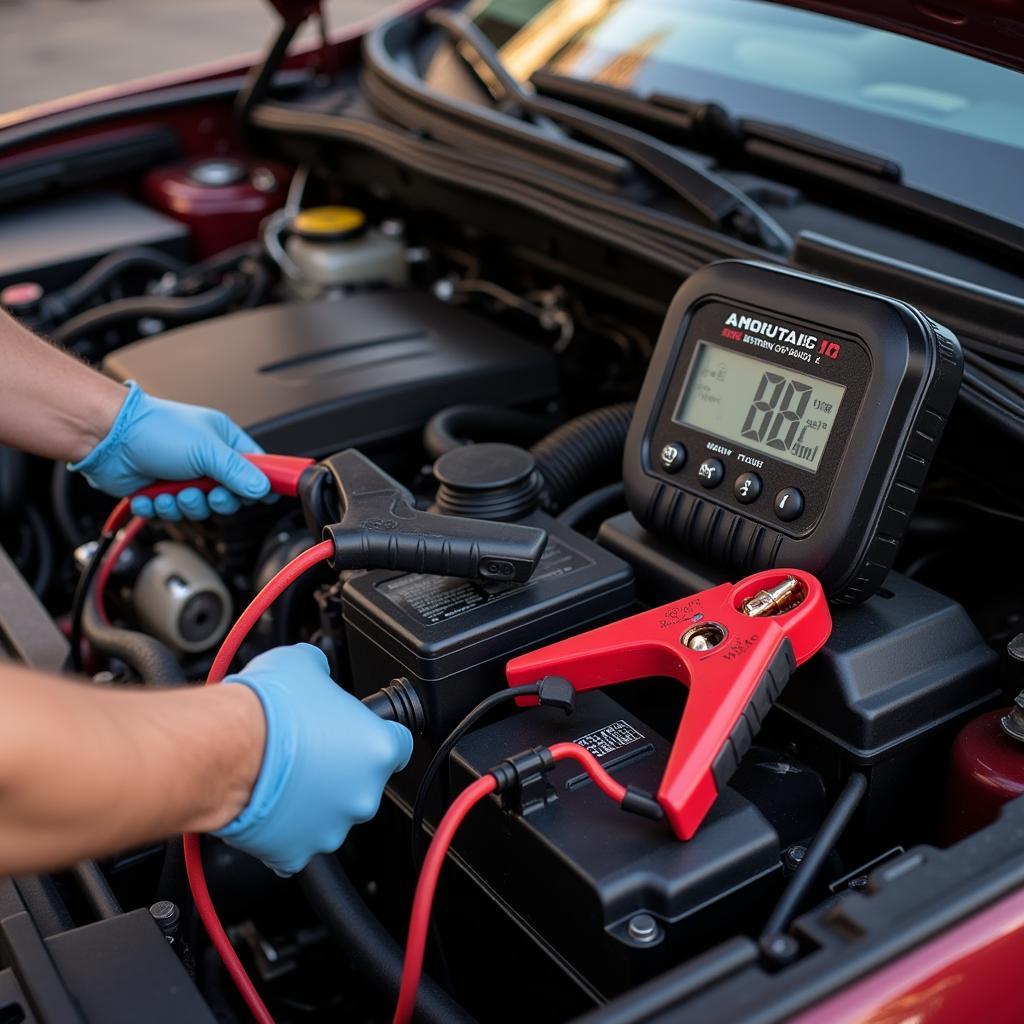A car’s electrical system is a complex network, and when things go wrong, it can lead to a variety of frustrating issues. Understanding the potential electrical problems in your car is crucial for both maintenance and troubleshooting. This article dives into common electrical problems, their causes, and how to address them.
Are you experiencing flickering headlights, a slow-starting engine, or perhaps a complete electrical failure? These are all signs of potential issues within your car’s electrical system. Don’t worry, you’re not alone. Electrical problems are a common occurrence in vehicles, both old and new. Understanding the root causes can help you prevent future problems and save you time and money in the long run. Let’s delve deeper into the world of automotive electrical systems. For further information on general electric car problems, check out this article: any problems with electric cars.
Common Electrical Problems in Cars
Battery Blues: The Heart of the Electrical System
The battery is the heart of your car’s electrical system. A failing battery can manifest in numerous ways, including slow cranking, dimming headlights, and difficulty starting the engine, especially in cold weather. Regular battery testing and replacement are essential preventive measures.
- Testing Your Battery: A simple voltage test can tell you the health of your battery. A fully charged battery should read around 12.6 volts.
- Signs of a Dying Battery: Look out for corrosion on the terminals, a swollen battery case, or a rotten egg smell.
Alternator Issues: The Power Generator
The alternator is responsible for charging the battery and powering the electrical system while the engine is running. A faulty alternator can lead to a drained battery and eventually a complete electrical shutdown.
- Symptoms of a Bad Alternator: Dim or flickering lights, a whining noise from the engine bay, and a battery warning light on the dashboard are common indicators.
Starter Motor Troubles: Getting Your Engine Going
The starter motor is responsible for cranking the engine to start it. A failing starter can produce a clicking sound when you turn the key, or the engine may crank slowly or not at all.
- Testing the Starter: A mechanic can test the starter motor using a variety of methods, including voltage drop tests and current draw tests.
Wiring Woes: The Nervous System of Your Car
Wiring problems, such as loose connections, corrosion, or damaged wires, can cause a range of electrical issues, from intermittent malfunctions to complete system failures.
- Inspecting Wiring: Regularly inspecting your car’s wiring for signs of damage is crucial for preventing electrical problems.
Fuse and Relay Failures: The Safety Guards
Fuses and relays protect the electrical system from overloads. A blown fuse or a faulty relay can disrupt the flow of electricity to various components.
- Checking Fuses: Checking and replacing blown fuses is a simple DIY task that can often resolve minor electrical issues.
Diagnosing Electrical Problems: A Step-by-Step Guide
- Visual Inspection: Begin by visually inspecting the battery, alternator, starter, and wiring for any obvious signs of damage or corrosion.
- Battery Test: Test the battery voltage to determine its health.
- Alternator Test: Test the alternator output to ensure it’s charging the battery properly.
- Starter Test: Test the starter motor to see if it’s functioning correctly.
- Wiring Check: Check the wiring for loose connections, corrosion, or damage.
What are the most common electrical problems in older cars?
Older cars, especially those with more complex electrical systems, can experience a variety of electrical issues due to aging wiring, corrosion, and failing components. Common problems include faulty alternators, failing batteries, dimming headlights, and malfunctioning gauges. For insights into specific electric car issues from a few years ago, take a look at: problems with electric cars 2017.
“Regular maintenance is key to preventing electrical problems,” says John Smith, a seasoned automotive electrician with over 20 years of experience. “Simple checks like cleaning battery terminals and inspecting wiring can save you a lot of headaches down the road.”
What are some signs of electrical problems in my car?
Some telltale signs of electrical problems in your car include dimming headlights, flickering interior lights, a slow-starting engine, a dead battery, malfunctioning power windows or locks, and unusual noises from the electrical system. If you encounter any of these, it’s essential to have your car checked by a qualified mechanic. Learn more about recognizing electrical problems in your car: signs of electrical problems in cars.
How can I prevent electrical problems in my car?
Regular maintenance is the key to preventing electrical problems. This includes regular battery testing and replacement, checking and cleaning battery terminals, inspecting wiring for damage, and ensuring all electrical connections are secure. Also, be mindful of the electrical load on your car’s system by avoiding overloading circuits. You might find interesting discussions on specific car electrical problems on platforms like Reddit, for example you can see some common British car electrical problems here: british cars electrical problems reddit.
“Don’t underestimate the importance of a good quality battery,” advises Jane Doe, a certified automotive technician. “Investing in a reliable battery can save you from being stranded with a dead car.”
Conclusion: Keeping Your Car’s Electric Heart Beating
Understanding what are a car’s electric problems can empower you to address these issues effectively and keep your vehicle running smoothly. From the battery to the alternator, each component plays a crucial role. Regular maintenance and prompt troubleshooting are essential for preventing costly repairs and ensuring a safe and reliable driving experience. Contact us at AutoTipPro for assistance with your car’s electrical issues. Our phone number is +1 (641) 206-8880 and our office is located at 500 N St Mary’s St, San Antonio, TX 78205, United States. Electric car problems can vary depending on the environment. Big cities present unique challenges: problems with electric cars big cities.






Leave a Reply